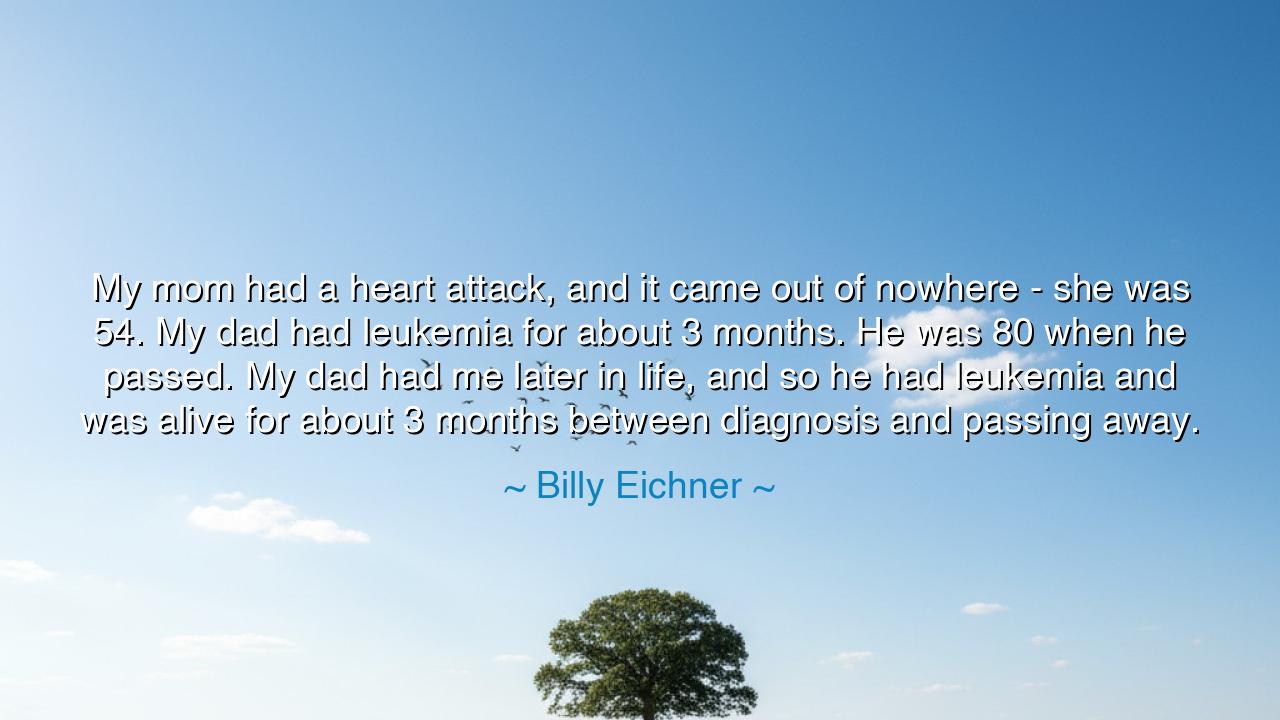
My mom had a heart attack, and it came out of nowhere - she was
My mom had a heart attack, and it came out of nowhere - she was 54. My dad had leukemia for about 3 months. He was 80 when he passed. My dad had me later in life, and so he had leukemia and was alive for about 3 months between diagnosis and passing away.






Hearken, children of the future, and listen with solemn hearts to the words of Billy Eichner, a voice shaped by both laughter and sorrow, who shares: “My mom had a heart attack, and it came out of nowhere - she was 54. My dad had leukemia for about 3 months. He was 80 when he passed. My dad had me later in life, and so he had leukemia and was alive for about 3 months between diagnosis and passing away.” At first, these words may seem a recounting of tragic circumstance, yet they carry a profound meditation on the fragility of life, the inevitability of mortality, and the preciousness of the moments we are granted. The ancients, from the Stoics to the sages of the East, would have seen in this a lesson on the fleeting nature of existence and the urgency to live with purpose.
Eichner begins with the abruptness of loss. His mother’s heart attack came unexpectedly, a reminder that life’s threads are delicate and often severed without warning. How many have known such sudden absence? Consider the Roman poet Catullus, who mourned his brother with a grief that speaks across centuries, teaching that the heart must reckon with sudden sorrow. Life, the ancients remind us, is not a promise but a gift, and we are merely stewards of the time we are granted.
Yet intertwined with the tragedy is a reflection on the brevity of awareness. Eichner’s father, struck by leukemia, lived only three months after diagnosis. Such brevity is a crucible, revealing the stark contrast between what is and what could be, between the love and guidance one desires to impart and the merciless march of fate. History offers similar lessons: the young Alexander the Great, struck by illness at thirty-two, could only imagine the empires he might have conquered. Yet even in fleeting time, meaning and legacy can flourish.
The narrative also evokes the complexity of life’s timing. Eichner’s father had him late in life, and thus the son witnessed both the vigor of his father’s late years and the swiftness of mortality. This is a truth the ancients understood intimately: life is not measured by years alone, but by depth of presence, by the intensity of love, teaching, and connection shared across the span granted. Confucius taught that the value of a parent’s guidance is found in the wisdom transmitted, no matter how brief the days of teaching may be.
Eichner’s recollection carries the weight of vulnerability and human limitation. None of us can command the longevity of those we love, nor forestall the tides of illness and fate. Yet in this recognition lies a profound lesson: to cling desperately to permanence is folly; to embrace the present, to cherish the living moment, is wisdom. The Stoic Seneca wrote that we must live as though we are always at the edge of departure, for in doing so, we awaken fully to the gift of today.
From these reflections emerges a meditation on gratitude and presence. Though loss is inevitable, the depth of our connection, the warmth of shared laughter and care, and the lessons imparted remain eternal. Consider Anne Frank, whose life was tragically brief yet whose diary continues to illuminate the human spirit. In fleeting time, she taught resilience, courage, and hope. Eichner’s own narrative reminds us that even the brevity of life does not diminish its meaning; rather, it magnifies the importance of attention and love.
Practically, this wisdom calls us to embrace those we love fully, without postponement. Speak words of kindness, offer acts of service, share laughter and learning, and carry forward the legacy of those who depart too soon. Acknowledge the fragility of life not with despair, but with courage and action, ensuring that each day is an offering of presence and purpose.
Thus, let it be known: life is precious, precarious, and fleeting, yet within its brevity lies the call to live fully, love deeply, and treasure each connection. Do not wait for tomorrow, for tomorrow is uncertain; embrace today as both gift and responsibility. In the face of loss, let memory guide, gratitude inspire, and presence empower, for it is in the conscious embrace of life that the human spirit finds its strength and its grace.






AAdministratorAdministrator
Welcome, honored guests. Please leave a comment, we will respond soon